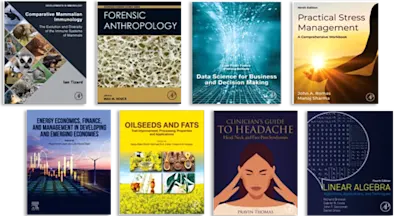
Carbene Chemistry
- 2nd Edition - July 10, 2013
- Imprint: Academic Press
- Author: Wolfgang Kirmse
- Language: English
- Hardback ISBN:9 7 8 - 0 - 1 2 - 4 0 9 9 5 6 - 2
- Paperback ISBN:9 7 8 - 0 - 1 2 - 3 9 4 1 5 4 - 1
- eBook ISBN:9 7 8 - 0 - 3 2 3 - 1 6 1 4 5 - 9
Carbene Chemistry, Second Edition discusses the developments in various areas of carbene chemistry, including the correlation of spectroscopic studies of isolated carbenes with… Read more
Purchase options

Institutional subscription on ScienceDirect
Request a sales quoteCarbene Chemistry, Second Edition discusses the developments in various areas of carbene chemistry, including the correlation of spectroscopic studies of isolated carbenes with quantum chemical calculations; new carbene precursors; differentiation of carbenes and carbenoids; and mechanisms of single and triplet carbine reactions. This book is composed of two main parts encompassing 13 chapters. The first part covers the many reactions known to transfer a formally divalent carbon fragment from one molecule to another, with special emphasis on the mechanism and a critical evaluation of the evidence for carbene intermediates. The second part examines the multitude of product-forming reactions of carbenes and carbenoids with various substrates. This part also describes the structure-reactivity relationships for both carbenes and their substrates, followed by a discussion of the applications of carbene compounds in synthetic organic chemistry. This work will be of great value to organic chemists and researchers.
Preface to Second EditionPreface to First EditionPart I Methylene Transfer Reactions Chapter 1 Introduction I. Examples of Methylene Transfer II. Mechanisms of Methylene Transfer III. Carbenes and Carbenoids Review Literature On Carbenes Chapter 2 Photochemical and Thermal Methylene Transfer Reactions I. Photolysis of Ketene II. Photolysis of Alkyl- and Arylketenes III. Photolysis of Carbon Suboxide IV. Photolysis of Diazo Compounds V. Pyrolysis of Diazo Compounds VI. Bamford-Stevens Reaction VII. Decomposition of Diazirines VIII. Decomposition of Cyclopropanes IX. Photolysis of Oxiranes X. Pyrolysis of 7-Norbornadienone Ketals XI. Rearrangement of Carbonyl Compounds XII. Decomposition of Polyhalomethanes XIII. Decomposition of Alkanes XIV. Reactions of Atomic Carbon XV. Decomposition of Olefins XVI. Desulfurization and Deoxygenation Reactions XVII. Decomposition of Ylides References Chapter 3 Organometallic Methylene Transfer Agents I. Catalytic Decomposition of Diazoalkanes II. Simmons-Smith Reaction III. Organolithium Reagents IV. Organomercury Reagents V. Organosilicon and Organotin Reagents VI. Carbene Complexes of the Transition Metals References Chapter 4 Base-Induced α-Elimination I. Basic Hydrolysis of Haloforms II. Trihalomethides in Aprotic Media III. α-Elimination at Methylene Halides IV. Dehydrohalogenation of Benzylic Halides V. Solvolysis of Propargyl and Allenyl Halides VI. α-Elimination at Alkyl Halides VII. Deprotonation of Carbonium Ions ReferencesPart II Structure and Reactivity of Carbenes and Carbenoids Chapter 5 the Structural Theory of Carbenes I. An Approach To the Electronic Structure Of Carbenes II. the Electronic Structure of CH2 III. Use of Extended Hückel Theory in the Elucidation of Carbene Structure IV. Halocarbenes V. Charge Distribution VI. Conclusions References Chapter 6 the Spectra of Carbenes I. Electronic and Vibration-Rotation Spectroscopy II. Electron Spin Resonance (ESR) Spectroscopy References Chapter 7 Reactions with Carbon-Hydrogen Bonds I. Insertion and Abstraction Mechanisms II. Stereochemistry III. Selectivity IV. Intramolecular Insertion References Chapter Addition to Alkenes I. Stereospecificity II. Stereoselectivity III. Reactivity IV. Synthesis of Cyclopropanes V. Addition Accompanied By Rearrangement VI. Intramolecular Addition References Chapter 9 Addition to Alkynes I. Formation of Cyclopropenes II. Formation of Bicyclobutanes III. Reactions with Enynes IV. Addition Accompanied By Rearrangement V. "1,3-Dipolar Additions" of Carbonylcarbenes VI. Thermal Reactions of Dialkyl Acetylene Dicarboxylates References Chapter 10 Addition to Arenes I. Aromatic Carbocyclic Compounds II. Aromatic Heterocyclic Compounds III. Intramolecular Reactions References Chapter 11 Reactions Involving Hetero Atoms I. Sllanes and Germanes II. Nitrogen Compounds III. Organophosphorus Compounds IV. Oxygen Compounds V. Organosulfur Compounds VI. Organic Halides VII. Organometallic Compounds References Chapter 12 Rearrangements I. 1,2 Shifts in Alkylcarbenes II. Cyclopropylidene-Allene Rearrangement III. Rearrangement and Fragmentation of Cyclopropylcarbenes IV. Cyclobutylidene-Methylenecyclopropane Rearrangement V. Wolff Rearrangement of Diazo Ketones VI. Rearrangement of Arylcarbenes References Chapter 13 Silicon, Germanium, AND Tin Structural Analogs of Carbenes I. Introduction II. Silicon Dichloride, :SiCl2 III. Silicon Dibromide and Diiodide, SiBr2 and SiI2 IV. Chlorosilyene and Bromosilyene, HSiCl and HSiBr V. Silicon Difluoride, SiF2 VI. Silylene, SiH2 VII. Silicon Atoms, Si VIII. Alkyl- and Arylsilylenes, RSiH and RR'Si IX. Silicon Monoxide and Silicon Monosulfide, SiO and SiS X. Germanium Atoms, Ge XI. Germylene, GeH2 XII. Dialkyl and Diaryl Germylenes, R2Ge XIII. Germanium Dihalides, GeX2 XIV. Germanium Monoxide and Monosulfide, GeO and GeS XV. Divalent Tin Compounds XVI. Conclusion ReferencesAuthor IndexSubject Index
- Edition: 2
- Published: July 10, 2013
- Imprint: Academic Press
- Language: English
- Hardback ISBN: 9780124099562
- Paperback ISBN: 9780123941541
- eBook ISBN: 9780323161459
Read Carbene Chemistry on ScienceDirect